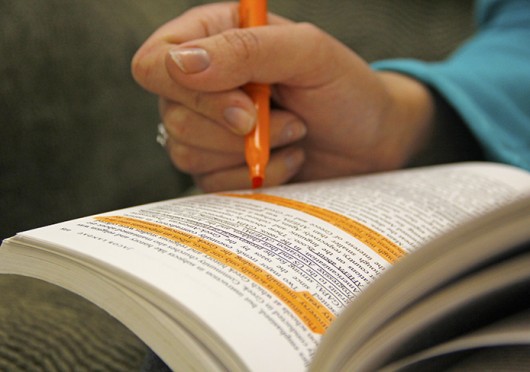
A student highlights a textbook. Some professors recently have encouraged their students to skim read assignments.
Credit: Photo illustration by Ritika Shah / Asst. photo editor
Though some Ohio State students think the amount of reading assignments they’re given per week is overwhelming, some professors insist that learning to read effectively is an important skill to have.
“When it comes to class discussions, it seems like (the professors) seem to focus on the details, so reading thoroughly would probably be better, but it’s hard to find the time to do that,” said Jill Ruby, a second-year in biomathematics.
While some students might feel burdened by the amount of readings given per week, some professors said it is important to learn how to fully read assigned articles before resorting to skimming through them.
“Every semester, I ask students how they feel about the course load and some students say the reading load was easy, and some students say the reading load was difficult, but I think it is a reasonable reading load,” said Jason Keiber, a graduate teaching associate and political science doctoral candidate.
Keiber, who teaches an international terrorism course, said he typically assigns his students about 50 to 75 pages a week.
“One of the values added in completing a whole piece, even if it’s difficult, is that you’re learning to read difficult pieces. So learning to read itself is a skill that continues to be developed in one’s life,” Keiber said.
For Cassidy Anderson, a second-year in photography and marketing, skimming through readings isn’t a major concern.
“The hardest part is getting over the hurdle of being distracted by other things,” Cassidy said.
Communication professor William Eveland said some complex articles assigned to students are better off being browsed through than thoroughly read.
“Often times the purpose of the readings is to show someone the forest, and if they try to read it closely to interpret every single individual sentence, they will be so overwhelmed they will miss the big picture, which is really important,” Eveland said.
Director of the OSU Dennis Learning Center Christopher Wolters said when given extended readings, undergraduate students can struggle with understanding what is important.
“It’s also part of the struggle and part of the learning process for students to tell the important stuff from the unimportant stuff, and that’s one of the skills professors hope students acquire in their domain,” Wolters said.
Wolters said the Dennis Learning Center, located at the Younkin Success Center on campus, provides academic workshops that help students learn skills such as reading in an efficient manner.
“We gear to helping undergraduates here improve their skills with things such as skimming strategies and reading strategies,” Wolters said.
Although he said he sometimes assigns an abundance of reading, Wolters said it is important for students to develop strategies in being able to understand and read through assignments.
“From an instructor’s perspective, there is so much I am excited about and so much I want (students) to learn,” Wolters said.
Depending on the assignment, Ruby said she reads about 200 pages per week, which takes about three to fours for her to complete.
“I feel like every professor wants their class to be the most important, but with us taking so many classes, it’s kind of hard for us to balance all the readings for every class,” Ruby said.
Keiber said the ability to learn to read assignments thoroughly is be a long-term skill that would be beneficial for students to learn.
“Reading is like any other skill. The more practice, the better you will get, (or) should I say, the better you will get at skimming,” Keiber said.


